Segregated professional networks. White-washed social media feeds. Shooting ‘token’ couples of color to diversify a portfolio.
These are just a few ways racial bias comes to life in the wedding industry. They are old yet effective practices that echo a distant era, with one purpose only: to bar people from certain joys, opportunities, and experiences.
We don’t want to keep answering the echo of that time, so it’s important for us to make some serious changes. We’re going to start by embodying what it means to be anti-racist, which is boldly opposing racism. That means we will endorse the beliefs, actions, and policies that promote widespread racial allyship.
We know that systematic racism in this industry won’t be fixed overnight, but if everyone contributes to real diversity and inclusion, we can eventually dismantle it.
So in a vow to do better and be better, we’re sharing eight actionable ways to be an anti-racist wedding professional. Read the powerful tips below, then share this message far and wide in the hope that one day, all shades of love will be celebrated equally.
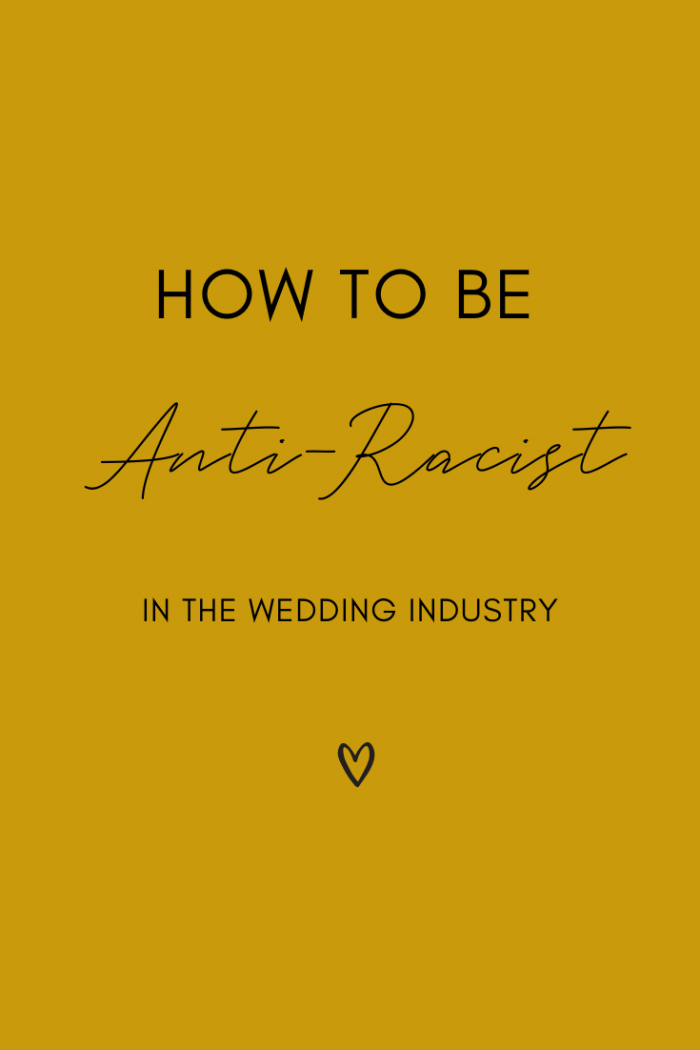
Step 1: Educate yourself on the history of race relations
Before you do anything on this list, educate yourself on what allies are really fighting for. This will help you learn what anti-racism is and how you can make a difference in the wedding industry.
There are tons of resources to help guide your journey. Last month, writer Alyssa Klein and activist and filmmaker Sarah Sophie Flicker compiled an impressive list of anti-racism materials. It’s filled with books, podcasts, articles, and films that highlight the history of systemic oppression, so give it a read. It even shares 18 anti-racism organizations to follow on social media.
Also, if you’re a photographer, read the British Journal of Photography’s List of Anti-Racism Resources For the Photography Industry. It covers everything from the perceived image of whiteness to racist ideologies that have existed in photography since 1839. The journal recommends books such as Decolonising the Camera: Photography in Racial Time by Mark Sealy and Troublemakers: Chicago Freedom Struggles through the Lens of Art by Erik S. Gellman.
Step 2: Diversify your network
This is the next vital step: curating the people you surround yourself with. If your network isn’t inclusive of all types of people, you’re missing an opportunity to uplift those who’ve been systemically oppressed.
We recently published a list of more than 100 Black photographers and filmmakers, and that’s a great place to start expanding your network. If you want to show industry-wide support, Junebug Weddings has an even larger list. It features 200 Black wedding vendors of every type, from florists to caterers. Make a difference right now by following them, sharing their work, and connecting in every sense of the word.
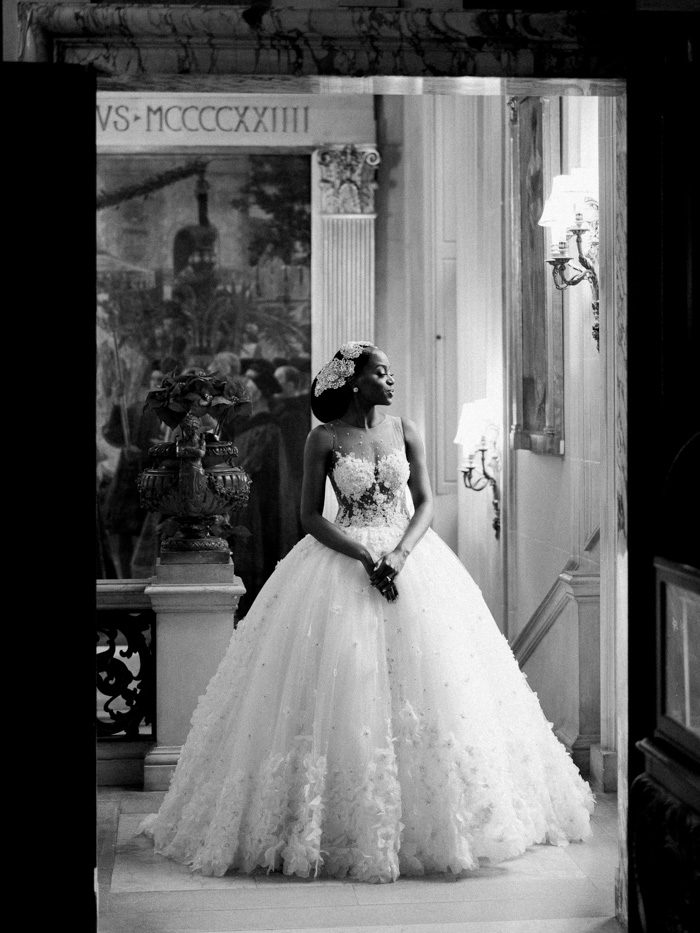
photo by Elizabeth Austin Photography
Step 3: Hire people of color, then treat them as equals
It’s not enough to simply hire people who don’t look like you. The next step is to treat them well at work, which doesn’t always happen in so-called ‘safe spaces’.
If you have any kind of authority, such as White privilege, don’t use it in harmful ways. Don’t microaggress your associate photographers, second shooters, cake decorators, or general assistants; don’t make anyone feel as if they don’t belong for being different than you. Simply put, avoid creating situations that people will eventually need saving from.
Also, consider hiring minorities for leadership positions because a diverse business needs diverse decision-makers. For example, if you have a wedding publication, hire editors of color. Many publications overwhelmingly feature White brides and grooms, and that’s something a cultured leader could easily fix. So as often as you can, welcome minorities into your business and support their ideas, especially the ones that’ll make your brand more inclusive.
Step 4: Pay people of color for their time and expertise
If someone does a service for you, show your appreciation by paying them. Cassie Lopez explains it perfectly in a recent From the Industry post here on Photobug:
“So often, I see the advice tossed around to have a ‘model call’ asking for same-sex couples, dark-skinned couples, etc. I’ve even read, ‘As long as you’re transparent about your desire to diversify your feed, there’s nothing wrong with it.’ ”
“I would argue that, as long as your work doesn’t stop at the model call, there’s nothing wrong with it. Start by paying your models. If you are using people to advertise your inclusiveness so you can make money off their community, you need to pay them. And not just to be your token model.”
Cassie is 100% right, and the wedding industry can support anti-racist movements by not exploiting people for capital gain.
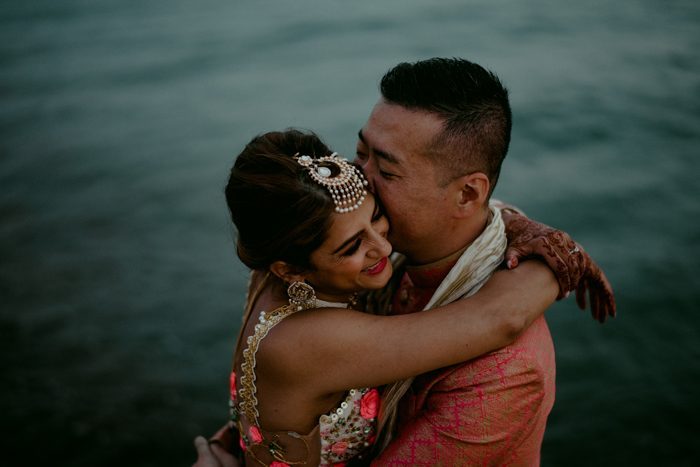
photo by Dallas & Sabrina
Step 5: Encourage clients, family, and friends to book people of color
Too busy to take on new work? Don’t let the opportunity go to waste because that way, everyone loses. Instead, refer a vendor from a minority community to do the job.
There are so many underrepresented photographers, filmmakers, DJs, makeup artists, florists, caterers, officiants, celebrants, planners, and more who don’t get the same opportunities as their White counterparts. As much as possible, be an action-oriented ally by bringing new business their way.
It might seem like a small gesture, but this is a huge step toward real inclusion. It’s a simple act that redistributes wealth and opportunity, so don’t underestimate the small assists.
Step 6: Show people of color on your website, portfolio, and social media feeds
Some strides have been made in this area. Many wedding professionals have stopped White-washing content to help normalize all skin tones. However, in the wedding industry, we sometimes miss the mark on celebrating people of color consistently.
To be clear, cherry-picking images of minorities to post here and there on a website or portfolio is tokenism. A splash of diversity on a photographer’s Instagram feed does not count as allyship. To truly be anti-racist, show images of non-white people as often as the status quo and give them a voice by sharing their stories. If you blog about the weddings you shoot, that means blogging minority love too; if you’re posting a Black couple on Instagram, that means thinking twice about typing #blacklivesmatter to grow your reach. When using the hashtag, only use it to address anti-racism as a movement.
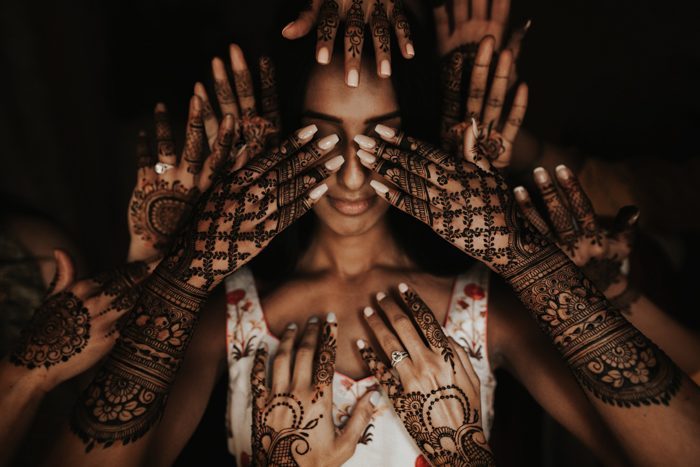
photo by Levi Hriczo
Step 7: Accept/book wedding work outside of your cultural range
One of the best anti-racist practices you can implement is booking a wide range of clientele. This is extremely important because historically, some vendors have refused minority business altogether.
Unfortunately, this form of discrimination hasn’t disappeared. Not even a year ago, a Mississippi wedding venue canceled a booking after discovering their customers were an interracial couple. In another incident, three couples sued the state of Virginia over its blatantly racist marriage application. They fought to remove a law requiring couples to disclose their race from a list of terms including ‘Aryan’ and ‘Octoroon’. Again, this happened less than a year ago.
Incidents like these are why wedding vendors should lead by example and serve all shades of people. If you support interracial love, multicultural communities, and the celebrations that come with them, let your work reflect that.
Step 8: Don’t feature, publish, or book plantation wedding work
…Because the optics are painful. Though it happened centuries ago, Black people and other descendants of slavery still experience social and economic disenfranchisement. Therefore, no one should have to endure the trauma of seeing plantation weddings online or in print. It reduces painful history to a mere photo-op, which is a shameful thing to practice in 2020.
To dismantle this racist practice, just say no. Tell that would-be client that you have (or hope to have) Black clients. And knowing the history behind these venues yet still supporting them disrespects the people who fund your livelihood.
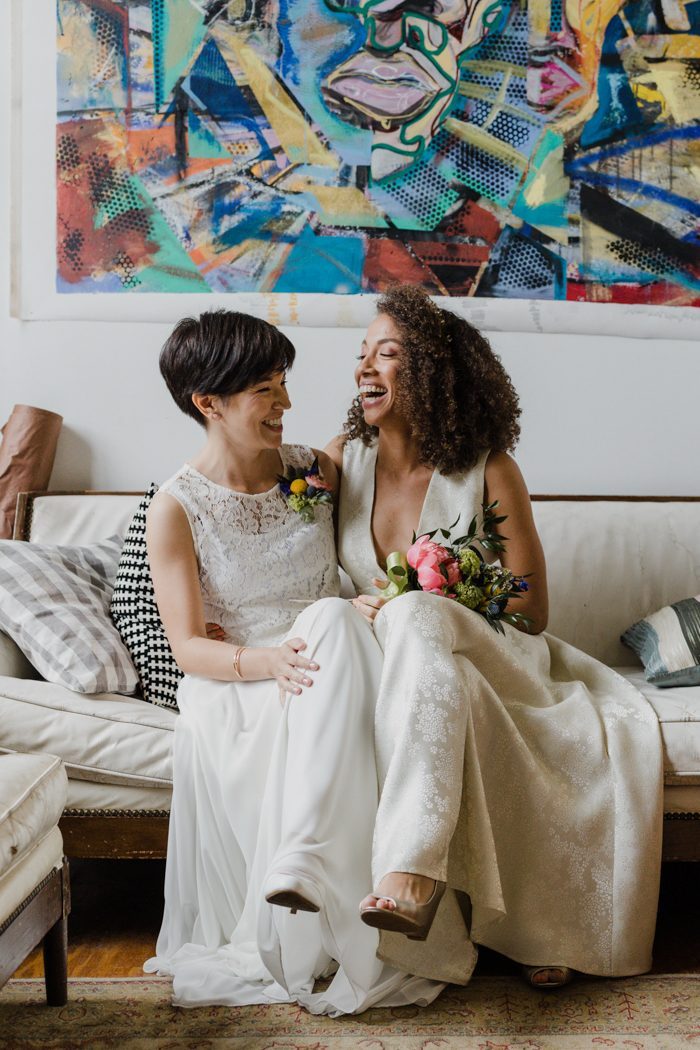
photo by M Lindsay Photography
It takes self-reflection and concrete action to be anti-racist
No matter how long it takes, do everything you can to address and dismantle racism in the wedding industry. It’s the key to normalizing not just one but all shades of love.
Have you implemented any anti-racist practices in your business? Let us know in the comments so we can keep updating this list.